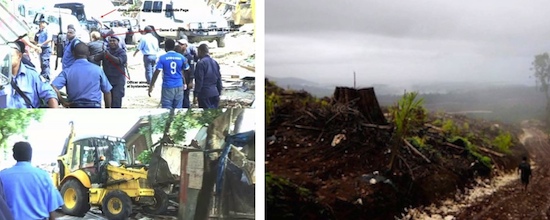Both the SABL land grab and the growing number of violent urban evictions in Papua New Guines are the symptoms of a misguided and destructive model of development.

Images show police violently evicting residents at Paga Hill in Port Moresby and the clearing felling of forest in the Pomio SABL areas
There may not seem to be much on the surface to connect them, but both the current rural and urban land grabs have at their root unrestrained capitalsim: a dominant and often violent economic model that in Papua New Guinea is allied with widespread corruption and the failure of the State to uphold the rule of law and protect the rights and interests of its citizens.
On the one side is the SABL land grab in which Special Agriculture and Business Leases have been used to unlawfully and unjustly take control of more than 5 million hectares of mainly forested land from rural communities. On the other there is the plight of urban settlers in places like Paga Hill (Port Moresby) and Bumbu (Lae), forced off land where they have been living for decades in quietly ordered communities by foreign companies who have 'acquired' the land in opaque and highly suspicious land deals.
Both types of land grab are visible symptoms of a development model that has been forced upon us by global forces and has been largely unwittingly, adopted by successive governments and a generation of bureaucrats schooled in a foreign education system.
Unrestrained capitalism seeks to attain unlimited and constant growth and has an unquenchable desire for resources, including land. It is this extreme capitalism that is the driving force behind the land grabs in PNG.
Unrestrained capitalism feeds off corruption, which is the mechanism it uses to unjustly, and often unlawfully, alienate land from those who occupy it and rely upon it for their daily existence.
The third ingredient is the State, which has been largely captured by foreign interests and is enslaved by the interests of foreign corporations and the foreign governments who back them. As a result the State consistently fails in its role of enforcing laws and regulations and protecting the rights of the individual.
Unrestrained capitalism, corruption and the failure of the State have created an illicit black economy in land in Papua New Guinea, both at the urban and the rural level.
The challenge for those who want to fight back and reclaim their land and set their own development path, is how to unify the rural customary landowners and urban settlers in one movement that can challenge the many layers of government, bureaucracy and corporate interests that have combined to steal their land.
How do they create a critical mass of people from these atomized and widely dispersed groups?
- rait man's blog
- Log in to post comments
